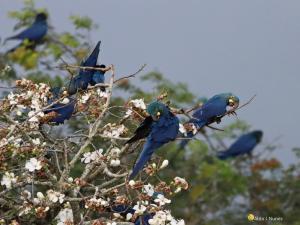Endangered Brazilian macaw species may face irreversible damage as of September
NGO creates an alert and requests an intervention from the Federal Prosecution Service to stop illegal international wildlife traffickers acting in Brazil
BRASILIA, DF, BRAZIL, August 3, 2023/EINPresswire.com/ -- NGO creates an alert and requests an intervention from the Federal Prosecution Service to stop illegal international wildlife traffickers acting in Brazil.
The Lear’s macaw species (Anodorhynchus leari) has possibly faced the worst scenario in its history during the past three months. In the second half of July, Surinamese authorities seized 29 specimens of this bird in a clandestine deposit located in the country’s capital, Paramaribo. This is the greatest documented seizure of the species since it was first encountered in the wild by scientist Helmut Sick in 1978. In late May, authorities from the International Airport of Dhaka, Bangladesh’s capital, confiscated three more specimens of Lear’s macaw that were being smuggled into the country. In March, the NGO RENCTAS International also tracked an internet video showing 6 more trafficked macaws locked in a small cage.
The Lear’s macaw is a Brazilian wild species endemic to the Raso da Catarina region, which is located to the center-east of the Bahia state, in the Caatinga biome. One of the rarest birds in the world, this species is classified as seriously endangered by the Brazilian government and several international organizations.
According to RENCTAS’ general coordinator, Dener Giovanini, “The trafficking of the 38 specimens, in such a small period, popped up an extremely unsettling alert. “It is an alarming number for a species that only has an average of 2.000 specimens living in the wild, even more concerning while considering studies indicating that only a part of these birds is able to reproduce”.
In an Official Statement to the Brazilian Federal Prosecution Service (MPF), RENCTAS points out strong evidence that illegal systematic activities are being conducted by international wildlife traffickers in the macaws' natural habitat.
RENCTAS informs that this species nests in huts located in the Raso da Catarina’s canyons, which require specialized knowledge in rappel to be accessed. The NGO also suspects that the macaws left Brazil in private jets chartered exclusively for this end. The document sent to the MPF informs that a single specimen of Lear’s macaw can be sold from U$60,000 to U$100,000 in the international market. In sum, this would mean that the seizure in Suriname equals around 2.9 million dollars.
The Lear’s macaw situation may escalate severely starting from next September, when this species’ mating season begins, and they become much more vulnerable to illegal wildlife traffickers. The report sent to the MPF also urges that wildlife law enforcement forces implement an emergency monitoring operation in the areas in which the species occur.
The government of Suriname has already contacted the Brazilian government and made itself available for repatriation of the 29 macaws seized by Surinamese authorities, whilst Bangladesh has not made an official statement on the subject until the publication of this report.
For further information, please contact RENCTAS - +55(61) 3550-7227 / E-mail: cgeral@renctas.org.br
www.renctas.org.br
Dener Giovanini
RENCTAS
+55 93 99131-0888
dg@renctas.org.br
Legal Disclaimer:
EIN Presswire provides this news content "as is" without warranty of any kind. We do not accept any responsibility or liability for the accuracy, content, images, videos, licenses, completeness, legality, or reliability of the information contained in this article. If you have any complaints or copyright issues related to this article, kindly contact the author above.

